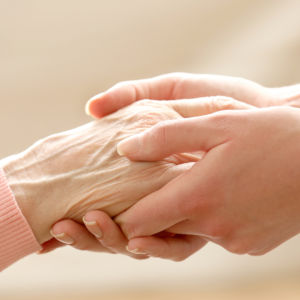Leonard was probably 75, in 2004, when I began really noticing his memory-loss issues. He became confused when he was driving. He wasn’t making good business decisions. And then he got so he would want the television on but he wasn’t really watching it. It was something just to look at like a picture on the wall. He didn’t want to do the things he used to do.
It was really hard. He would forget things and began asking the same question over and over, such as, “When are we going to have dinner, Jeannie?”
Sometimes I’d get angry with him because I didn’t know why he kept repeating himself. Once I looked him in the eye and said, “Look at me. I said we’re having dinner in about 10 minutes.” They didn’t know much about Alzheimer’s back then like they know now.
The doctor told me, “We think he might have Alzheimer’s. But we won’t know until we do an autopsy. Either way, there’s no point in telling him because he won’t know what it means.” And I thought that was ridiculous. I know now one of the first things caretakers should do before a loved one gets more deeply into Alzheimer’s is to talk with them about it.
There were times when we laughed. I used to buy him colorful jockey shorts: burgundy, green, black and tan. I always got the brightest colored shorts I could because he liked bright colors. One day I put a pair of my black lace panties to dry on the wide edge of our bathroom jacuzzi. The next morning I went to see why Leonard was not coming out for breakfast and there he was, struggling, trying to get my black lace panties up over his legs. … He said, “Jeannie, you’ve shrunk my shorts again.”
And I laughed, and I said, “You’re a cross dresser. I never knew that.” And he laughed too, so he knew what I meant.
One of the very hardest things for me was to realize I wasn’t just losing my husband. I was losing my lover, my friend, my mentor. I lost it all in one man as I became nurse and caregiver.
Finally my best friend and my daughter both said, “Jeannie, you’re under too much stress. You’ve got to do something about it.” So I went to the doctor and got on a treadmill. Suddenly I had the worst pain I could possibly imagine. I had a major heart attack. They admitted me in for quadruple bypass surgery early the next morning.
I was told I couldn’t take care of my husband anymore. I still get tears in my eyes when I think about that moment. It was awful. Probably the very toughest thing I ever did in my life was to find a nursing home to put him in. I must have looked at probably 10 or more facilities in Las Vegas.
I visited him every day. At first he didn’t want to stay. He tried to follow me out the door and his caregivers had to stop him. I had to crack open the door and squeeze through while they held Leonard back. Then it got to where he knew he couldn’t go with me so he wanted me to stay overnight with him, and I couldn’t do that.
Leonard didn’t always remember our relationship. One day we were talking and he asked, “Have we known each other a long time?” And I said, “Yes, a very long time.” He said to me, “Maybe we should get married.”
I said, “Yes, I think we should.” And, of course, that’s the last time it was mentioned. He then forgot all about it. It wasn’t all sad.
Mostly we’d sit in his room and have meals together. I’d sit on his lap and talk to him and we cuddled. During the last few months of his life he changed. I’d show up, but after a few minutes he’d say, “You go now. You go.”
And I’d say, “But I just got here. Can’t I just sit with you?”
“No, go.”
“How about if I just sit here next to you in this chair and hold your hand?”
“Go!”
Those were the times when I didn’t know whether I could get to my car fast enough to cry. I never cried in front of him.
Over the years I had so many people tell me that Leonard didn’t recognize me anymore. And I’d say, “Don’t count on that because it’s the brain that has Alzheimer’s; the heart doesn’t. The heart knows if you care.”

